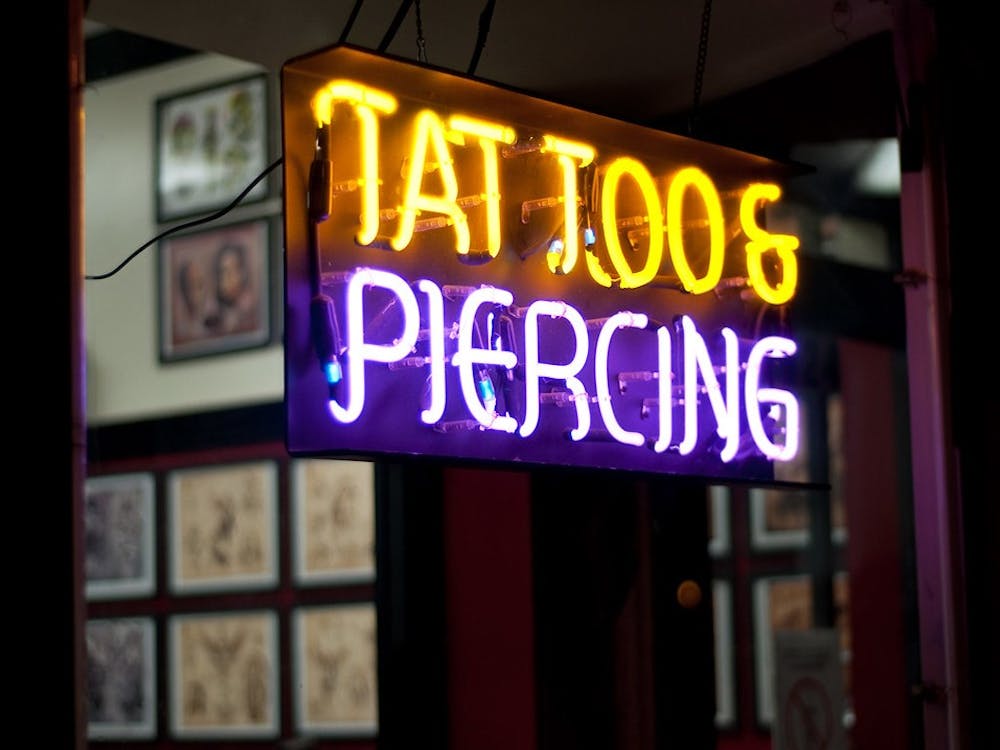Friday the 13th is consistently anticipated to be an eventful day among horror film fanatics and the subtly superstitious, but it is also a significant day in tattoo shops across the country. Sailors believed that tattooing the traditionally unlucky number 13 on their bodies would deter bad luck from following them, which encouraged others to flaunt the symbol with simple, spooky designs. Dallas tattoo artist Oliver Peck turned this trend into an event in the ‘90s and tattoo shops have been celebrating the mystic day with special events and mysteriously low prices — typically, $13 mysterious — since.
Ironically, Friday the 13th was the last time Durham’s Welcome Tattoo shop was operating normally.
The March 13 event was supposed to be a party — the owners booked Wonderpuff to serve gourmet cotton candy and planned giveaways for those who joined the gathering. The festivities, however, were quickly adapted to address the rising concerns about COVID-19 in the state. The owners modified this notoriously-crowded celebration into a first-come, first-served flash event. Clients could choose a piece of palm-sized flash for $130, and all proceeds went toward the nonprofit of the client’s choice. Welcome Tattoo maintained the artistry and convenient prices of each Friday the 13th, but sacrificed its electric atmosphere to protect the Durham community.
“We already clean a lot, as you can imagine,” owner Morgan Grimm said. “We just became extra aware of cleanliness, wiping down clipboards and door handles after every customer. We limited the number of people allowed in the shop at one time and only let in people who were actually being tattooed.”
Lively and inviting energy is necessary for a tattoo shop — even if buzzing needles and blood-stained gloves threaten your bravado, there is comfort in the echoing post-grunge playlists and muffled admiration for wall-hung collages. The dying vivacity within the tattoo shop was indicative of the impending shutdown. The shop voluntarily closed their doors two days later.
“It all happened so fast. We went from not hearing about anything coronavirus-related to being affected by it overnight,” Grimm said. “We felt that closing was the best thing to do for our community at the time.”
A week after Welcome Tattoo closed, Gov. Roy Cooper ordered personal care and grooming services to close by March 25 at 5 p.m. All barber shops, hair, nail, and beauty salons and massage and tattoo parlors were shut down due to their inability to provide service while social distancing. These businesses are dependent on in-person contact, and, as a result, are desperately struggling through the COVID-19 crisis. Restaurants and retail shops are undeniably experiencing financial losses, but they can still partially operate under current conditions. Tattoo artists, on the other hand, cannot deliver their product to your doorstep.
“I feel like [tattoo shops], nail techs, hairdressers, massage therapists, a lot of those in-person services are just in a complete standstill,” Grimm expressed. “There is really not much that can be done until we see a decline in cases.”
In addition to losing a steady source of revenue, many new businesses have not been operating long enough to qualify for small business loans. One-year-old Welcome Tattoo, too new to obtain such loans, has utilized creative methods of bringing in money. Grimm explained how one tattooer, Kohen Meyers, has been creating and selling his artwork in an unpromising attempt to earn an income as the pandemic prohibits his livelihood. The shop also hosted a raffle in which the winner would receive a free original flash design — designs that typically cost anywhere from $100 to $500.
Amid selling merchandise and hosting raffles for the shop, Welcome Tattoo’s main focus has been promoting other small businesses in Durham.Their Instagram page kindly pushes followers to donate to the Triangle Restaurant Workers Relief Fund for the chance to win a free flash tattoo.
“Right when we closed we did a big raffle for the Triangle Restaurant Workers Relief Fund. We realized we’re not the only ones going through this,” Grimm explained. “I think Durham has always been great about supporting local businesses, so it is nice that we can continue to do that.”
Ultimately, small businesses are depending on the support of consumers — their neighbors — to stay afloat. It may seem inconvenient to scope out a local business carrying the products you want instead of visiting your preferred cookie-cutter capitalist wonderland, but shopping small benefits the entire community. Not to mention, locally created products — from Pincho Loco’s refreshing ice cream to Heavenly Buffaloes’ late-night greasy satisfaction — allows customers to explore the city through innovative, artistic products crafted by people passionate about their work. They’re working for you. And right now, they need you more than ever.
“Buy from local shops and local restaurants as much as possible. Buy from them instead of Amazon or a major chain store. We’ve been buying groceries from our neighbor Accordion Club,” Grimm said. “What’s really important is that financial support. If you’re not able to financially support, then share what those businesses are doing with your friends and family on social media to help bring in customers.”
As a writer and reporter, I would typically end this article with some drawn-out moral message that I can only hope resonates with each reader. But as someone who loves and misses the Durham community, I would much rather ask you to support the local businesses and people that complete the Durham experience, even if your experience only lasts four years. Now is not the time to pretend I have some profound wisdom to share. If you are able to, please shop small. Shop local. Shop Durham.
Get The Chronicle straight to your inbox
Sign up for our weekly newsletter. Cancel at any time.

